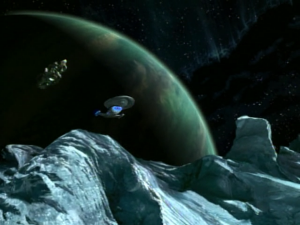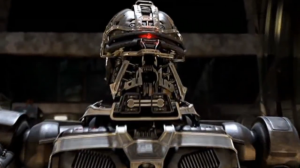Franchise Potential: What has it, What Doesn’t
- December 1st, 2014
- Posted in Opinion/Analysis
- Write comment
 Media franchises are a ubiquitous thing these days. It’s rare to see a Hollywood blockbuster that isn’t part of an established franchise already, and even then a lot of them are transformed into franchises after their success (see Pacific Rim for an example of that). But there’s a big problem in that kind of a thought process, and it’s that not everything that’s successful is well-suited for transformation into a full-fledged franchise. Here, we’re going to look at a few examples of shows and films that evolved into franchises and try to look at why some succeeded and others failed. What better way to start off than by continuing the comparisons of Star Trek versus Battlestar Galactica?
Media franchises are a ubiquitous thing these days. It’s rare to see a Hollywood blockbuster that isn’t part of an established franchise already, and even then a lot of them are transformed into franchises after their success (see Pacific Rim for an example of that). But there’s a big problem in that kind of a thought process, and it’s that not everything that’s successful is well-suited for transformation into a full-fledged franchise. Here, we’re going to look at a few examples of shows and films that evolved into franchises and try to look at why some succeeded and others failed. What better way to start off than by continuing the comparisons of Star Trek versus Battlestar Galactica?
Starting off with the big dog as far as live action sci-fi goes, Star Trek began as just a single series in the 1960’s, one that died unceremoniously until Star Wars reignited America’s passion for sci-fi on the big screen. But it certainly didn’t stop there. By the 90’s, Star Trek was not only a successful film franchise, but it had two TV series running simultaneously on top of it. That is an absolutely massive footprint on the public consciousness, especially for the time. For almost 20 years straight, there was some form of Star Trek on TV, and while it did eventually come to an end, it’s a run that’s hard to top in the arena of American television. Something about Star Trek‘s vision of the future, even in its darkest moments, appealed to the world.
Jumping forward to the 21st century, Battlestar Galactica had a critically successful run for 4 seasons (and a miniseries to start it off) that spanned 6 years, a very similar length of time to that of Star Trek: The Next Generation. It also went on to produce two spinoffs (Caprica and Blood & Chrome), just like TNG did. But unlike TNG‘s spinoffs, which lasted 7 seasons each and went on to produce yet another spinoff, both Caprica and Blood & Chrome arrived dead in the water, with no chance of success. So what’s the deal? Why was Star Trek‘s franchise formation received to such great success, while BSG wasn’t able to do it at all?
Contrary to any beliefs about the relative qualities of any of these shows, it’s a problem with much deeper roots. From day one of Gene Roddenberry’s plans for Star Trek, he made it clear that this was a wide open world where any number of things could happen. It had a stable premise that lent itself to vast exploration, be it looking at social issues through the lens of science fiction or a subversion of the Alien-style horror story before it even existed, or just good old-fashioned brawls with a being impersonating a god. Star Trek‘s world does have its limits; the Federation is currently unable to exit the galaxy, and the supernatural absolutely does not exist in this world, even if it can sometimes look like it. At its roots, however, Trek is open to anything. If you tell your story well, you can probably find a way to tell it from within that universe.
Galactica, on the other hand, started off with a very narrow premise: mankind is on the run from their killer robots, and their only goal is survival. There’s no home base to go back to, no organization supporting the fleet. There is very little in the way of alien life, or life of any kind on the various planets, except what the humans’ ancestors left behind along the way. The supernatural does explicitly exist, and has interfered with the plot on more than one occasion. More than all this, though, the show has a distinct endpoint established from the beginning: get to Earth and begin society anew. Once these goals are accomplished, what story is there left to tell in this universe? Not much. It’s a premise that supports one long story about the exodus of humanity and no more.

“Okay, now, here me out. What if we have a show about a Cylon standup comedian who tells jokes like, ‘Colonials fight wars like this…’ Wait! I haven’t even gotten to the punchline!”
With such a limited premise to build off of when trying to make a spinoff, they just weren’t able to pull it off. Worse still, they had boxed themselves in with the ending by destroying all their technology, making a sequel series of any kind impossible. The only option left was a prequel. But there was a big problem with that, too. BSG had gone to great lengths to make it apparent that the Colonial society that predated the show was not a nice place, even implying that they deserved to be destroyed (and that the Cylon raid was essentially an act of God, much like an old testament-style purge such as Noah and the flood). So not only does Caprica have to contend with the usual problems that prequels face, but it also had to deal with the fact that it was set in an almost inherently evil society. That’s damn hard to do well on the best of days, much less when you’re coming after a hotly debated finale to a show set in the same universe. It’s little wonder that they struggled from the first episode to get the tone right. If only they’d made it to season 2, eh?
While Caprica failed, BSG itself was still popular. Syfy knew there had to be more to do there, but the same problems presented themselves and we ended up with another prequel. There are other reasons that Blood & Chrome wasted its premise, but at the heart of matters, it’s just more proof that the 2003 Battlestar Galactica was just not set up to allow for expansion into a franchise. It was a stand-alone work and should have been treated as such.
But there’s more to creating a successful franchise than an open premise, and we’ll get to that next week.





No comments yet.